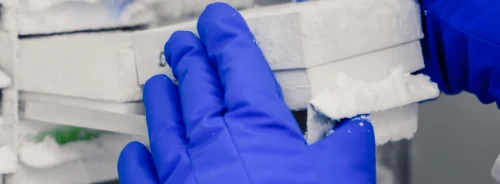As the medical landscape evolves, gene therapy medicinal products (GTMPs) have emerged as a significant development in treating genetic diseases. With the increasing approval of GTMPs, hospital pharmacies play a crucial role in ensuring their safe and effective handling. However, many institutions lack standardised operating procedures (SOPs) for managing these advanced products. The European Association of Hospital Pharmacists (EAHP) has developed comprehensive guidance to address this gap. An article published in the European Journal of Hospital Pharmacy outlines vital aspects of these guidelines, focusing on receipt and storage, dispensing, transportation, and disposal of GTMPs, all within the framework of local regulations.
Receipt and Storage of Gene Therapy Medicinal Products
The safe handling of GTMPs begins with their receipt and storage, which involves strict adherence to biosafety protocols. GTMPs are typically temperature-sensitive and costly, requiring specialised cold-chain logistics during transportation. Hospital pharmacies must inspect the packaging for damage upon delivery, and personal protective equipment (PPE) must be used in case of contamination.
Storage requirements for GTMPs vary by product, with some requiring ultra-low-temperature storage, such as liquid nitrogen. GTMPs should ideally be stored in separate, biohazard-labelled freezers to avoid cross-contamination. Depending on local regulations, separate shelves within shared storage units may suffice when dedicated freezers are unavailable. Continuous monitoring of storage temperatures and robust contingency plans for equipment failure are essential to avoid compromising product integrity. These considerations help ensure that GTMPs are maintained in a stable state until they are ready for use.
Dispensing and Reconstitution in a Controlled Environment
Dispensing GTMPs requires meticulous attention to aseptic techniques, which help prevent microbial contamination. GTMP reconstitution, the process of preparing the product for administration, typically occurs in a clean air device, such as a biological safety cabinet or pharmaceutical-grade isolator. These devices should comply with local standards like the European Standard EN12469:2000 to ensure both product and handler safety.
The reconstitution and dispensing process should follow clearly defined SOPs, including steps for managing consumables, transferring between sterile and non-sterile areas, and addressing potential spillages. Strict decontamination of surfaces and equipment before and after each use is mandatory to minimise the risk of cross-contamination. In cases where institutional infrastructure is insufficient, mobile isolators can be used to perform reconstitution at the administration site. This approach is gaining traction in countries like Denmark, although each institution must ensure compliance with local regulatory requirements.
Transportation and Administration of Gene Therapy Medicinal Products
The transportation of GTMPs within a healthcare facility, whether from the pharmacy to the clinic or elsewhere in the hospital, requires stringent safety measures. GTMPs should be transported in double-enclosed, leak-proof containers, labelled appropriately for biohazard. Temperature control must be maintained during transport, following the product-specific guidance provided in clinical trial documents or the Summary of Product Characteristics (SmPC).
Trained medical professionals, including physicians and nurses generally perform GTMP administration. Coordinating between clinical and pharmacy staff is vital to ensure that reconstituted GTMPs are administered promptly, given that many products have a short shelf life after preparation. PPE requirements during administration vary depending on the biosafety classification of the GTMP and local regulations, and precautions should be taken to protect both patients and healthcare workers from potential viral shedding.
Conclusion
With the increasing adoption of GTMPs in clinical practice, hospital pharmacies must be equipped with the necessary infrastructure, training, and SOPs to manage these advanced therapies safely. The EAHP's guidelines provide a robust framework for developing institutional policies that ensure the safe handling of GTMPs across their entire lifecycle—from receipt and storage to administration and disposal. By adhering to these guidelines and integrating them with local regulations, hospital pharmacies can ensure that they are prepared for the growing role of gene therapy in healthcare.
Source: European Journal of Hospital Pharmacy
Image Credit: iStock






